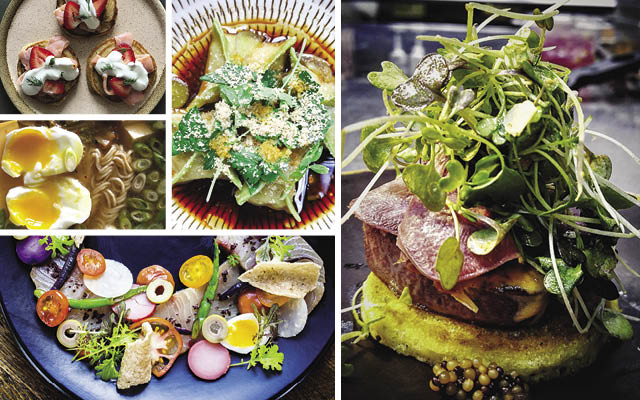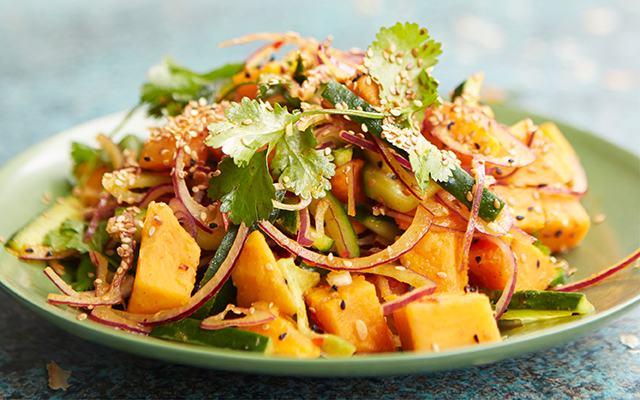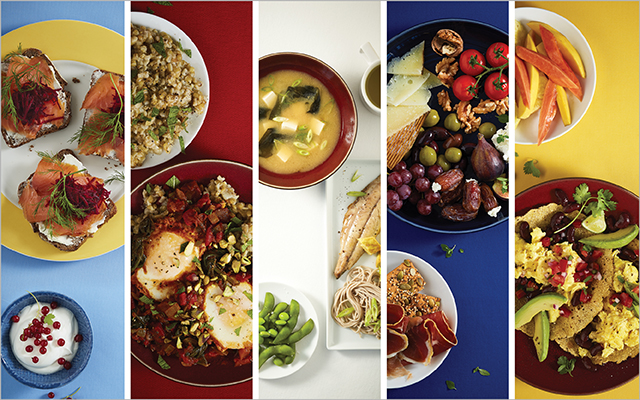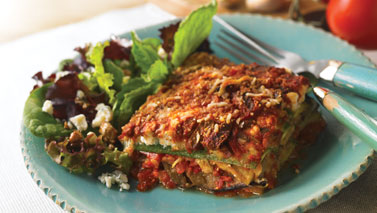Brooklyn-born Edward Lee is known for serving unconventional dishes. At his restaurants in Washington, D.C., and Louisville, Ky., you’ll find items inspired by flavors from his Korean heritage and traditional fare of the American South, like octopus bacon.
But to the self-trained chef who has starred in The Mind of a Chef and Fermented, food goes beyond ingredients. “To care about food is to care about people,” he explains. “Eating puts me on a road to asking questions.”
Lee’s memoir, Buttermilk Graffiti: A Chef’s Journey to Discover America’s New Melting-Pot Cuisine, outlines what he discovered while tasting Peruvian dishes in Paterson, N.J.; German favorites in Milwaukee, Wis.; and Lebanese delicacies and contraband whiskey in the delta of Clarksdale, Miss.
The seven-time James Beard Award nominee discovered a unique culinary fusion — a mingling of new flavors and ingredients that challenge notions of authenticity and tradition. “The story of American food is one of transformation,” he writes.
His journey offered many unexpected tastes. But a visit to Dearborn, Mich. — home to one of America’s largest Muslim communities — resulted in the opposite: an “accidental” fast.
Joining the communitywide ritual during Ramadan taught Lee what it’s like to eat by not eating. It also brought empathy and a deeper understanding. “I feel I’ve learned more about being human from attempting to fast,” he notes.
Experience Life | How did you choose the 16 towns highlighted in the book?
Edward Lee | I had a list of places that I’d visited before and some, like Lowell, Mass., that I knew had a large Cambodian community residing there, but had never visited.
What I found interesting was that every time I told someone about what I was doing, people had a recommendation for me. They’d say, “If you’re interested in immigrant groups and food, you gotta go here and try this!”
That was encouraging because it proved what I felt, which is that we all know these food communities exist everywhere; they’re just not written about on a mainstream level.
But every person living in a town or a city in America knows where there’s a really cool Mexican neighborhood where you get the best tacos or a Vietnamese neighborhood where you get the best pho. This diversity happens because of immigrants and cultures colliding.
EL | What is the relationship between food and stories?
EL | Food often gets put under a microscope. We dissect the ingredients, technique, and science of it. That’s all fascinating, but we forget that food is really made by the hands of people, and that it’s an extension of our cultures, traditions, and histories.
Sure, every culture creates music and art, but we eat several times every day. There’s something profound and deep about our relationship to food. When you start investigating food on that level, you can’t help but be curious about the people making it.
I don’t think you can truly understand Middle Eastern cuisines, for example, without examining the religion of the person cooking, because it has a huge impact on how and why they cook food in the way they do.
EL | What did you learn by joining the community act of fasting for a few days?
EL | When I sipped tea at iftar (the meal eaten in the evening to break the fast), it was like I had never tasted mint before.
Beyond flavors, many of the residents I spoke with explained that, while Islam may be very complex, the idea of fasting is very simple. It’s about having empathy and understanding for the poor and the suffering.
I almost felt guilty eating food after 12 hours of fasting, which is not an emotion that you normally associate with feasting. Fasting teaches you to eat with more humility and reverence, which is different from how you feel when you sit down to a 12-course meal.
EL | How can a fresh take on a familiar food change our perceptions?
EL | Most people — and I experience this as a restaurant owner who uses analytics to look at customer habits — order what is already familiar to them. It’s just human nature.
For me, there’s not much more familiar than a bowl of noodles. But when you take something so familiar and make it completely surprising, that’s a huge accomplishment in food.
That simple act of eating a noodle dish made from lamb broth rather than pork or beef broth brought me back to being a student who’s discovering things for the first time. Those are really valuable moments in life. They demolish any preconceived notions that you have about food, which can help change your perceptions about other people and aspects of your life.
EL | Did writing this book help you achieve your goal of finding your own America and where you belong in it?
EL | It helped me understand where I belong, where I stand, and what I’m doing here. It raised more questions, too.
That’s a process that all of us have to go through. For those of us who were born or raised here, we tend to think it’s our America just because we’re here. But we all may have very different definitions of what it means to be American.
Because of that, I think it’s important — especially in times when there’s a lot of division and we’re trying to define what it means to be American — to go on a personal journey and ask, Who am I, and how do I belong in this really complex place called America with its short but complicated history?
We can choose to blend in and think, I’m American because I like football and I eat hot dogs and apple pie. Or we can go and say, I’m American because I embrace the cuisines of immigrants who make up the backbone of American culture.
If you can accept that hummus and egg rolls are American food, then you can begin to see the new version of those things like kapi (fermented shrimp paste) and Cambodian noodles as American food. If you can accept those foods as American, you expand your notion of who can be an American as well.
I don’t think food can save the world, but it can change our perception. It can bring us together at a table. I think it’s imperative that we each take the time to come to a personal recognition that we have to get along with one another, and food is a medium for that exchange.




This Post Has 0 Comments